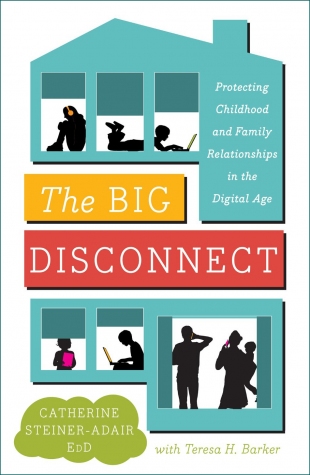"Some tech-specific principles for the sustainable family:
"• Parents take responsibility and engage actively with children. This means installing protective software, blocks, or apps to limit their access to levels of content they are not developmentally ready for or which you simply don't want them to access.
"• Children earn privileges by showing responsibility and establishing trust. Why wait for a $500 credit card bill for Miss Kitty app accessories that your six-year-old clicked to buy as she played on your smartphone on the family vacation? Establish clear rules about access and downloading anything and other rules that keep tech safe and fun for your child at any age.
"• Mistakes are treated as teachable moments. Children are encouraged to fess up and they are allowed to learn from mistakes. Shaming them is not an option. Hearing them out, talking it through, adding to their understanding, and holding them accountable is.
"• Family members have shared expectations re communication via tech. You're entitled to say If I text about a date, or a plan, please text back — like now. If I text and say I'm going to leave a voice message, know that you should listen to it — like now. If I call and let it ring three times, it's important, pick up. If you said you will text so I know you are safe, DO! There is a shared sense of responsibility to the other person who loves you at the other end. It can change daily, but changes need to be agreed upon — and acknowledged.
"Here are some other helpful reminders to consider when you give your child a phone with texting privileges. No need to be an ogre spelling these things out; by giving your child a phone, you're expressing trust in her readiness to be responsible. Be encouraging — but clear:
"• Having this phone is a privilege that can be revoked. Like getting the keys to the car. It's not really a gift. I'm giving you this to use with the understanding that I expect you to use it in the ways we've discussed. If you take it to school, you follow school rules — no exceptions. Don't use this phone to initiate or forward mean stuff or sexy stuff. No porn, no illicit anything. And if anything happens to the phone — if you lose it or break it — you're responsible for replacing it.
"• Parents should always have the password to the phone. I reserve the right to scroll through your phone if I'm ever worried about your safety.
"• This phone doesn't replace real conversations with your family and friends: I know a phone isn't just a phone anymore, it's a mini-computer, but remember that important conversations should happen face-to-face. Don't use this to hide or escape from what's going on around you. Do not live your life on your phone. Don't let your phone become your life.
"• Safety, health, and good habits come first and always: No using the phone when you're crossing streets. No sleeping with your phone. The phone stays off during homework and family meals. It's easy to get dependent on all this tech — don't get caught up in it like that.
"I have seen so many parents and kids build resentments, agonize for hours, or burst into tears because of mixed messages through mixed media. Family means we work harder to get it right as much of the time as we can.
"• Common sense and manners matter and must prevail in tech-assisted communications. A philosophy of courtesy teaches your children that. Resist the fast-twitch urge to text or perhaps even e-mail anything with serious emotional content. Big news, bad news, sad news, sometimes even the happiest news can be sensitive communications. In many families, there are still many people who feel hurt when they read about a death or engagement on line, rather than hearing it and sharing their felt reaction with you. Is it okay in your family to e-mail a condolence note? Maybe, maybe not. Check it out. It's family."
